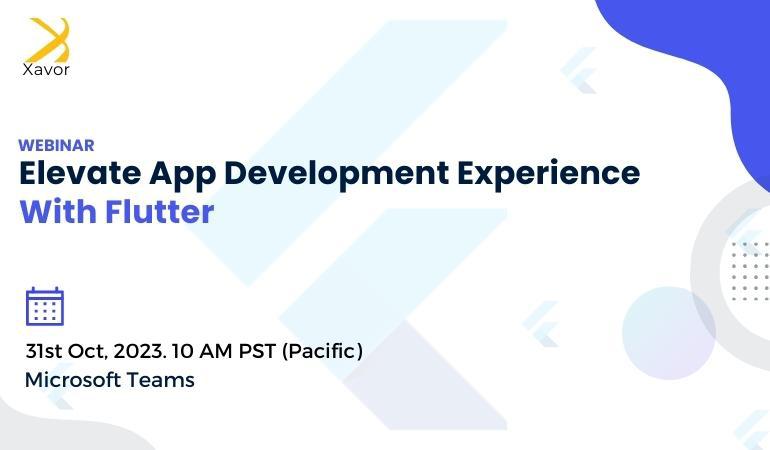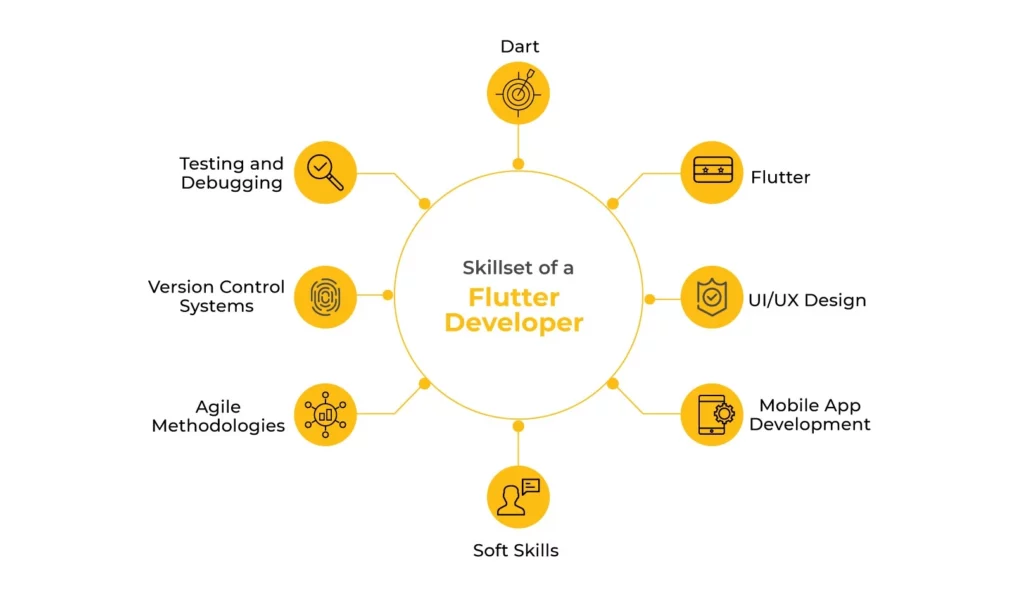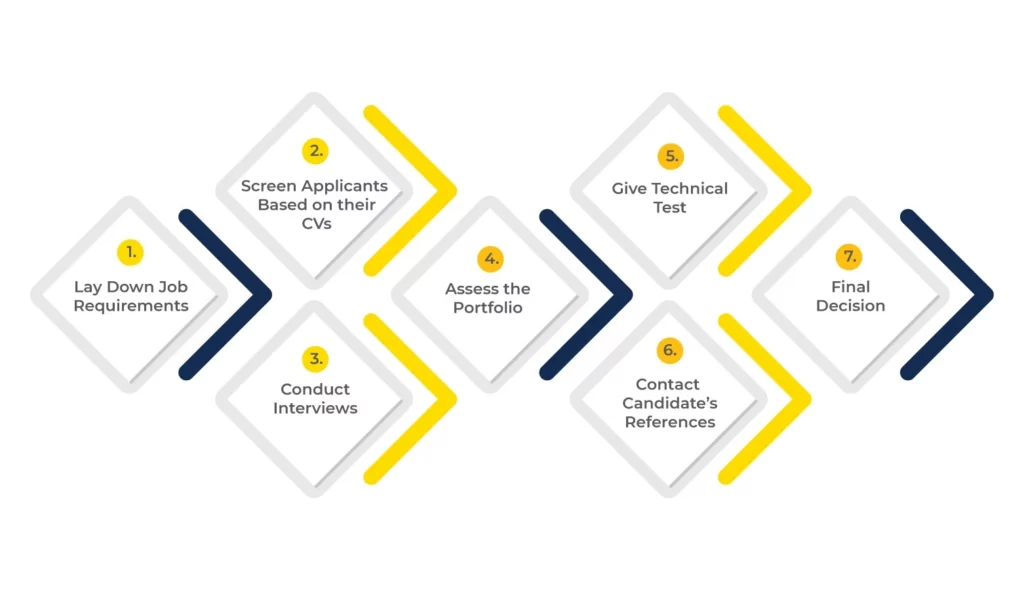The need for skilled developers is constantly growing as the technology landscape evolves. Developers are in high demand because they help businesses stay ahead of their competitors. However, finding a good developer can be a challenging task for companies. How do you ensure that your resource is the right one? Worry not; this article explains how you can hire a skilled Flutter developer in 2023. It discusses the critical factors you need to consider when hiring a Flutter developer, including best practices and the latest industry trends.

Register now: https://www.xavor.com/flutter-webinar/
What is a Flutter Developer and Why You Need to Hire One
Based on the Dart programming language, Flutter is a popular open-source framework developed by Google. Developers love it because it allows them to create dynamic, cross-platform mobile, web, and desktop applications with delightful user interfaces.
Companies belonging to various industries choose it for building their applications. There are many reasons why businesses want to develop their apps using Flutter. It allows you to create visually appealing, fast, and high-performance apps. This is why hiring a Flutter developer is often considered a good choice.
Hiring a skilled Flutter developer ensures that your customers get a responsive and engaging application. It also enables you to get the benefits of Flutter technology, helping you save resources and time without compromising on the quality of the app.
Flutter has a single codebase, unlike other popular frameworks like Swift and React Native. That means developers can use it across various platforms like Android, iOS, Linux, Windows, macOS, etc. You don’t have to create separate codebases for different platforms, thus cutting down on development time. This is one primary reason why Flutter, launched in 2018, has overtaken React Native on GitHub in terms of popularity.
Advantages of Flutter App Development
Before we discuss the developer skills and engagement models for hiring Flutter developers, it would be great to shed some light on the benefits flutter app development.
1. Fast Development
Flutter is known for enabling faster application development. It uses the hot reload feature to give your developers the ability to view changes made to the application. Not only does it give you that capability, but it does so without impacting development speed when you want to fix a bug or extend an application feature. As a result, developers can make changes in a fraction of the time it takes to do the same on other frameworks.
2. Cost-Effectiveness
Cost considerations are vital for all business decisions. Flutter, being an open-source framework, has a robust and thriving community which makes it easy for developers to find online support. It also boasts a large amount of documentation they can benefit from.
Moreover, being a cross-platform framework, Flutter saves you a lot of development time since you don’t have to write separate code for different platforms. Similarly, its hot reload feature and widgets mean that your development time is significantly reduced, thus saving costs.
3. Excellent Performance
Flutter apps are based on the Dart programming language, which offers exciting widgets that give a native-like feel to Android and iOS applications. As a result, the Dart SDK compiles into the native code, thus removing the requirement for OEM (original equipment manufacturer) widgets. This means that Flutter’s engine directly interacts with native modules, ensuring your app performs well.
Other Flutter benefits include the following:
- Constant updates
- Easy to test
- A free and open-source framework
- A large community of developers with lots of documentation and support
Skills to Look for in a Flutter Developer
You must hire the right person as your Flutter developer – the success of your cross-platform application depends on finding the right resource. To ensure that you hire the right person, it is essential that you first understand the skills you need to look for in potential candidates.

Here are some of the leading expertise and skills your Flutter developer should possess.
1. Dart
A sound understanding of the Dart SDK is a critical competency for a Flutter developer. The framework uses this object-oriented programming language to build interactive cross-platform applications. It enables them to manage their application codebase seamlessly.
2. Flutter
Just the way your developer needs to have a deep understanding of Dart, they also need to have an equally robust knowledge of the Flutter framework. They must adequately understand the Flutter framework’s various elements, tools, features, and architecture.
This is critical as it allows the developer to create delightful user experiences and fully leverage the framework. Moreover, a deep understanding is also vital because it enables the developer to overcome and fix any technical problems during the development process.
3. Mobile App Development
Developers need a sound knowledge of the entire mobile application software development process – from design ideation to development to testing and delivery. Every skilled developer is aware of the pitfalls inherent in the development process and how to overcome them.
A good Flutter developer is also aware of best practices and the latest industry trends in the mobile application development industry. This knowledge base enables them to optimize application performance.
4. UI/UX Design
Understanding the basics of good design is vital for Flutter developers. It enables them to develop aesthetically pleasing applications with engaging and innovative user interfaces. It is, therefore, essential for a Flutter developer to have a good understanding of UI/UX design patterns.
A good UI/UX design is necessary for delivering a user experience par excellence. This is why the resource you hire should be good at understanding design elements and what makes an application visually appealing.
5. Agile Methodologies
Agile software development refers to a set of development practices focusing on responding to change quickly, adapting, and cross-functional collaboration. It is an iterative development process that helps deliver working software in a relatively short time.
Flutter developers with a profound understanding of Agile are more likely to deliver high-quality projects. That’s because Agile focuses on streamlining project delivery while ensuring high quality and transparency among all stakeholders, especially clients.
6. Version Control Systems
An experienced and skilled Flutter developer is adept at using version control systems like Git. This necessary skill enables them to develop Flutter applications efficiently by allowing them to collaborate with others and handle and monitor code changes. Moreover, version control systems offer a margin of safety in case an issue arises, enabling a developer to go back to the earlier version of code without a hassle.
7. Testing and Debugging
Testing and debugging are essential components of the software development process. It enables developers to save time and ensure that the end-users like the app based on its features and performance. Robust testing and debugging also decrease the chances of app failure by letting the developer identify and resolve potential issues.
8. Soft Skills
Apart from the technical skills we have mentioned, a developer also needs to have soft skills like the ability to work with other teams and colleagues, effective and open communication, and the ability to manage conflict.
In the human resource sector, it is a widely held belief that soft skills are as crucial as the technical skills of a resource. A developer can be an excellent coder, but if they cannot adapt to change, respond to criticism amicably, and collaborate with others, they will bring little value to the company. This is why companies seek team players and individuals with good social skills. There’s a reason why emotionally intelligent people are more successful in their careers.
Different Engagement Models for Hiring Flutter Developers
Companies have several options to choose from when it comes to hiring a Flutter app developer. You can hire someone on a freelance basis through platforms like Fiverr, Toptal, and Upwork or get a dedicated in-house resource working full-time for the company.
You can also opt to outsource the project through what is commonly known as staff augmentation, a hiring model where you hire a resource temporarily to meet specific project requirements. Offshore and nearshore hiring models under staff augmentation are fast gaining popularity due to their cost-effectiveness.
Each model comes with its own benefits and drawbacks. Your business needs and goals will determine your decision to choose a certain model. Let’s discuss each of these.
1. Freelance
Hiring a freelance developer has become very popular today, as evidenced by the number of people offering their services on gig platforms like Fiverr and Upwork. However, before you choose to hire a freelance Flutter app developer, you should consider the following factors:
- You must thoroughly assess potential freelancers and see whether their expertise and the projects they have completed align with your project requirements. This is a critical consideration as it ensures that the resource will deliver the results you are looking for.
- Gig platforms give ratings to freelancers based on their ability to meet deadlines and satisfy clients. Read the client reviews on potential Flutter freelancers to gauge their ability to meet your requirements.
- Assess your project requirements properly and convey them to potential candidates. Also, you should communicate the payment terms and any intellectual property rights concerns you may have.
The major benefit of hiring a freelance Flutter developer is that it offers you cost savings. All you have to pay is the per-hour rate that you decide. You don’t have to give them a workspace or other perks and benefits associated with an in-house resource.
Moreover, when you choose to hire a freelancer, you have a wide array of options to choose from. You can access a global talent pool and choose a resource that fits well with your needs.
However, the disadvantage of going with the freelance option is that there can be language barriers if you hire an offshore resource. The time zones can also vary, thus making it challenging to collaborate and work as a single unit. There’s also a risk that the resource might ghost on you, leaving you high and dry in the midst of a project. This can have significant costs.
2. Outsourcing/Staff Augmentation
Outsourcing and staff augmentation, although different models work similarly in that the hiring company outsources the project to another company under the outsourcing model. Staff augmentation, on the other hand, refers to hiring a resource through a third-party vendor to do a job temporarily.
Both staff augmentation and outsourcing are becoming increasingly popular in the tech industry, as their benefits are numerous. Here are some of the leading benefits of outsourcing.
- As a customer, you don’t have to go through the hassle of developing the application yourself – your vendor is responsible for the development process, including the testing and deployment.
- Outsourcing and staff augmentation also open up to you the doors to a global talent pool, allowing you to choose high-quality developers at significantly lower costs if you hire from developing countries like India, China, Pakistan, etc.
- Companies offering staff augmentation or outsourcing services usually possess robust expertise in their field. This can help ensure that your Flutter app is top-notch with very few chances of failure or issues.
- This model also costs you less than hiring an in-house team because you don’t have to rent an office space for the team, nor do you have to give extra perks and benefits linked to in-house resources.
- Another crucial benefit is that you can focus on your core strategic objectives while leaving the application development to the Flutter experts hired temporarily.
The major disadvantage of these models is that a language barrier may prevent effective collaboration, not to mention the difference in time zones. However, English is now a global language, and many companies in developing countries ensure that their resources don’t face a language barrier when dealing with Western companies.
Another possible issue in an outsourcing model is the loss of control over the development process. However, you can easily overcome this issue by arranging regular (weekly or biweekly) meetings to ensure everything is on track.
Both these models work well for companies looking to execute midsize or small projects. It is also a great option for businesses that don’t have the relevant in-house development expertise and those who want to save money.
3. In-House Team
An in-house development team is the best option for you if you fulfill the following criteria:
- You are going to do a large-sized project that would necessitate close coordination and collaboration between various teams.
- You have a software house that is already into application development and is now looking to add a Flutter development team.
- It’s not a one-off project; you expect to have more Flutter application development projects coming your way.
- You have the financial wherewithal to expand and add a new team to your business.
The most significant advantage of having an in-house team is that they are always available to respond to your queries and can immediately incorporate changes without delay. Moreover, you get to have complete control over the development process. There is also no concern about language barriers, time zone, or cultural differences that may impede smooth working.
However, there are certain disadvantages involved as well. For instance, having an in-house development team costs significantly more than outsourcing it or hiring a freelancer. Moreover, you need to have a steady inflow of new projects if you want to maximize your return on investment. Hiring an in-house time for a one-off project is not the best course of action, for you will experience downtime, and your resources will remain idle, thus increasing your costs.
Steps for Hiring a Flutter Developer
Hiring a good Flutter developer can seem like a challenging task. You need to consider all the relevant aspects and ensure that the person fits your business needs and project goals. Hiring the wrong resource can spell the death knell for your project, causing immense damage to your brand reputation besides costing you money.

Whichever hiring model you opt for, here is a list of seven steps you can take to ensure that you hire the right resource.
1. Lay Down the Job Requirements
This is the first step in hiring a good resource. You should identify the skill set, experience, education, certification, etc., you want your Flutter developer to have. When you specify these factors, it helps you narrow down the search and helps invite suitable job applicants.
2. Screen Applicants Based on their CVs
This is the second step, which entails screening applicants based on their CVs. You can use this stage to further narrow down the hiring process by eliminating applications that do not meet the requirements you laid out in the first step. You should assess the candidates’ documents and gauge whether they meet the job requirements or not.
3. Conduct Interviews
Once you have narrowed down the number of eligible applicants in the second step, it is time to conduct online/in-person interviews. Maybe your company has the policy to conduct two to three interviews – you can do the preliminary ones online and the remaining in person (for in-house Flutter developers).
This step involves identifying whether the candidate has the proper technical skill set and relevant experience. You can ask them about their past projects and how they think they can contribute to your company. Don’t forget to ask technical questions on the Flutter framework, Dart, and UI/UX design at this stage.
4. Assess the Portfolio
If the candidate gives satisfactory answers to technical questions at the interview stage, you can proceed to analyze their portfolio. You can ask for code snippets to get a glimpse of their technical skills. A portfolio assessment is an essential part of ensuring you hire a person with the requisite skill set and experience.
5. Give a Technical Test
Checking and analyzing a portfolio is a good step. However, it is best practice to ask the candidate to perform a technical test, like a coding test. This helps the interviewer assess the candidate’s skills and ability to work under pressure.
It also helps one evaluate the candidate’s problem-solving capabilities, besides enabling them to see their knowledge and expertise on the Flutter framework and Dart programming language.
6. Contact Candidate’s References
Getting in touch with a candidate’s past employers is a good way to analyze their work ethic. It also helps you verify their honesty about their achievements and skills. You can ask their previous employers about the candidate’s technical and soft skills, like their collaboration ability. This information can help you make the right hiring decision.
7. Final Decision
Once you have evaluated the candidate’s technical skills and verified their experience by contacting references, it is time to make the final call. Just make sure you factor in your company’s culture and the candidate’s likelihood of adapting to it. This is critical, and it must not be ignored.
Xavor’s Flutter Application Development Services
Xavor is a leading technology company based in Irvine, California. We have served startups and F500s with innovative digital solutions. Our experienced Flutter application development team can deliver Flutter apps with incredible UX/UI, ensuring an exceptional user experience. We also offer Flutter developers for hiring.
Drop us a line today at [email protected] to book a free consultation session with Web & Mobile App Development team.












